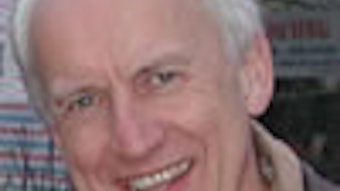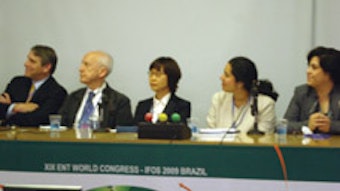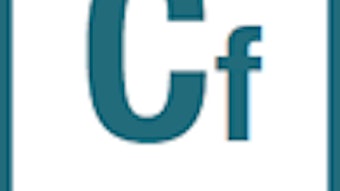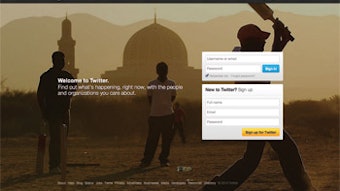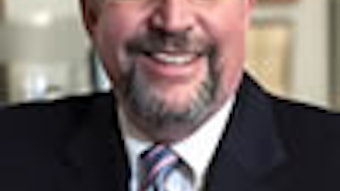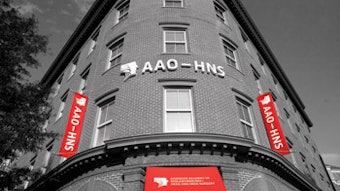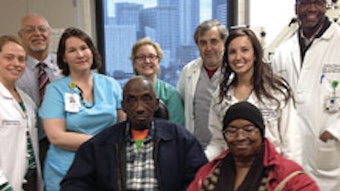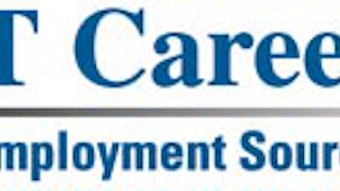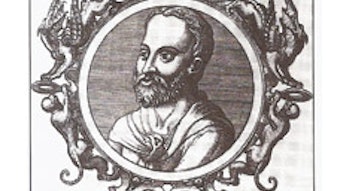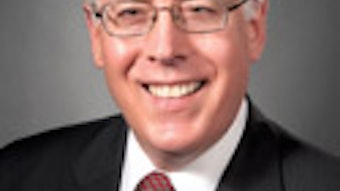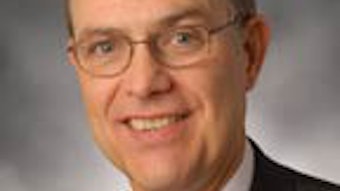Lessons of Leadership from Lincoln
James L. Netterville, MD AAO-HNS/F President This Bulletin issue is packed with items you will want to know about. Since last month, general registration has opened for the AAO-HNSF 2013 Annual Meeting & OTO EXPOSM, and the May BOG Spring Meeting & OTO Advocacy Summit now boasts success. The BOG offered a powerful program including the Presidents Forum that introduced the two individuals who stand for President-Elect this year, Marvin P. Fried, MD, and Gayle E. Woodson, MD. Following the BOG, the Summit provided briefings on legislative issues with U.S. Representative Phil Roe, MD (R-TN), and U.S. Representative Mike Burgess, MD (R-TX). The next day, Members met with their Members of Congress and/or staff (more than 120 Capitol Hill visits were pre-scheduled) to talk about legislative matters key to the quality practice of otolaryngology—head and neck surgery. Read more about Academy legislative activities on pages 34 and 35. The Foundation continues its push for quality with the guideline summary on page 14 taken from this month’s journal supplement topic, “Clinical Practice Guideline: Improving Voice Outcomes after Thyroid Surgery.” This summary will be a great resource to have at hand. On page 22, read the second article spotlighting the Academy’s International Program innovations—this time focusing on events planned for our Annual Meeting in Vancouver, BC, September 29–October 2. This also is the time of the year when you may preview the 2014 FY Proposed Budget on page 12 that reflects our strategy in several new areas. Presenting the budget to the membership is both a responsibility and privilege for your leaders. What and Who Will Make a Good Leader? The Academy and Foundation candidates’ statements are the centerpiece of this issue and are as vital to our legacy as our strategy and budget. I am always awed by the caliber of you, my colleagues, in everything you undertake. What I have observed is that I can never really predict who will become an outstanding leader among other leaders. I have been surprised by the emergence of a person who can listen as well as speak and who evolves an even-handed approach to challenges, respecting each point of view that he/she meets as a contribution to the dialogue. So, it may be that in the process of accepting a nomination, developing a platform statement, and ultimately in the act of volunteering for the challenge, that a good leader is really made. Thanks to the actor Daniel Day Lewis, many of us have a new appreciation of Abraham Lincoln’s masterful leadership skills. In connection with that film, I recently came upon an article (Vozza, S, Entrepreneur, www.entrepreneur.com/blog/225284, accessed May 1, 2013), emphasizing four lessons learned from Lincoln about leadership. I paraphrase these here as we look for our future society leader:A leader: 1. Says no to “yes” men. Lincoln chose his cabinet from among his rivals, not his close friends and admirers. The men he picked were eager to share opposing points of view. Lincoln encouraged their challenges. He used the opportunity to reflect and debate. It gave him the confidence to make an informed decision on an issue. 2. Is decisive. One outcome of so many opinions within the leadership circle was that debate was constant and might have led to constant discussion without resolution. Lincoln had the skill to gather the facts needed and to know when he had enough information to deliberate. At that point, he sought solitude to make a decision he knew he could stand by. 3. Connects with people on a personal level. Lincoln knew the value of liberal arts. He studied not just law, but mathematics, art, and philosophy. He used nature’s lessons to learn wisdom as well. The movie illustrates this skill as Lincoln draws from these studies to make a point about human rights with two young telegraph office clerks, “Euclid’s first common notion is this: ‘Things which are equal to the same thing are equal to each other.’” 4. Looks for inspiration in unlikely places. Now we know that Lincoln as Honest Abe was trustworthy, but he was not standoffish and stuffy. He engaged with people as a storyteller and a jokester and looked for commonality. He made himself approachable as a human being and to underline his common man accessibility, he kept regular office hours for citizens to visit. So, I look forward to our election with anticipation that I will again witness this evolution within our own Membership. To all who have stepped up as candidates, I wish you the very best of luck and hope that you will find the experience a good one no matter the outcome. And for all of us Bulletin readers, I think you will find this issue excellent reading. (See a brief video statement from the President-Elect candidates now on the Academy website at www.entnet.org, as well.)
James L. Netterville, MD
AAO-HNS/F President
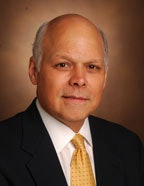 James L. Netterville, MD, AAO-HNS/F President
James L. Netterville, MD, AAO-HNS/F PresidentThis Bulletin issue is packed with items you will want to know about.
Since last month, general registration has opened for the AAO-HNSF 2013 Annual Meeting & OTO EXPOSM, and the May BOG Spring Meeting & OTO Advocacy Summit now boasts success. The BOG offered a powerful program including the Presidents Forum that introduced the two individuals who stand for President-Elect this year, Marvin P. Fried, MD, and Gayle E. Woodson, MD. Following the BOG, the Summit provided briefings on legislative issues with U.S. Representative Phil Roe, MD (R-TN), and U.S. Representative Mike Burgess, MD (R-TX). The next day, Members met with their Members of Congress and/or staff (more than 120 Capitol Hill visits were pre-scheduled) to talk about legislative matters key to the quality practice of otolaryngology—head and neck surgery. Read more about Academy legislative activities on pages 34 and 35.
The Foundation continues its push for quality with the guideline summary on page 14 taken from this month’s journal supplement topic, “Clinical Practice Guideline: Improving Voice Outcomes after Thyroid Surgery.” This summary will be a great resource to have at hand.
On page 22, read the second article spotlighting the Academy’s International Program innovations—this time focusing on events planned for our Annual Meeting in Vancouver, BC, September 29–October 2.
This also is the time of the year when you may preview the 2014 FY Proposed Budget on page 12 that reflects our strategy in several new areas. Presenting the budget to the membership is both a responsibility and privilege for your leaders.
What and Who Will Make a Good Leader?
The Academy and Foundation candidates’ statements are the centerpiece of this issue and are as vital to our legacy as our strategy and budget. I am always awed by the caliber of you, my colleagues, in everything you undertake. What I have observed is that I can never really predict who will become an outstanding leader among other leaders. I have been surprised by the emergence of a person who can listen as well as speak and who evolves an even-handed approach to challenges, respecting each point of view that he/she meets as a contribution to the dialogue. So, it may be that in the process of accepting a nomination, developing a platform statement, and ultimately in the act of volunteering for the challenge, that a good leader is really made.
Thanks to the actor Daniel Day Lewis, many of us have a new appreciation of Abraham Lincoln’s masterful leadership skills. In connection with that film, I recently came upon an article (Vozza, S, Entrepreneur, www.entrepreneur.com/blog/225284, accessed May 1, 2013), emphasizing four lessons learned from Lincoln about leadership. I paraphrase these here as we look for our future society leader:A leader:
1. Says no to “yes” men.
Lincoln chose his cabinet from among his rivals, not his close friends and admirers. The men he picked were eager to share opposing points of view. Lincoln encouraged their challenges. He used the opportunity to reflect and debate. It gave him the confidence to make an informed decision on an issue.
2. Is decisive.
One outcome of so many opinions within the leadership circle was that debate was constant and might have led to constant discussion without resolution. Lincoln had the skill to gather the facts needed and to know when he had enough information to deliberate. At that point, he sought solitude to make a decision he knew he could stand by.
3. Connects with people on a personal level.
Lincoln knew the value of liberal arts. He studied not just law, but mathematics, art, and philosophy. He used nature’s lessons to learn wisdom as well. The movie illustrates this skill as Lincoln draws from these studies to make a point about human rights with two young telegraph office clerks, “Euclid’s first common notion is this: ‘Things which are equal to the same thing are equal to each other.'”
4. Looks for inspiration in unlikely places.
Now we know that Lincoln as Honest Abe was trustworthy, but he was not standoffish and stuffy. He engaged with people as a storyteller and a jokester and looked for commonality. He made himself approachable as a human being and to underline his common man accessibility, he kept regular office hours for citizens to visit.
So, I look forward to our election with anticipation that I will again witness this evolution within our own Membership. To all who have stepped up as candidates, I wish you the very best of luck and hope that you will find the experience a good one no matter the outcome. And for all of us Bulletin readers, I think you will find this issue excellent reading. (See a brief video statement from the President-Elect candidates now on the Academy website at www.entnet.org, as well.)


